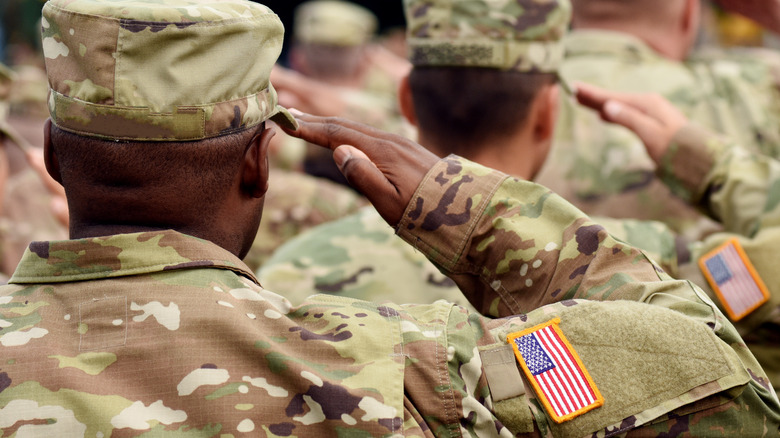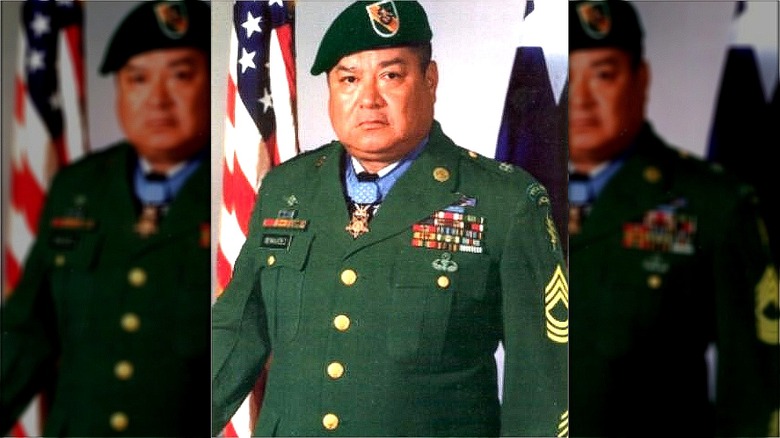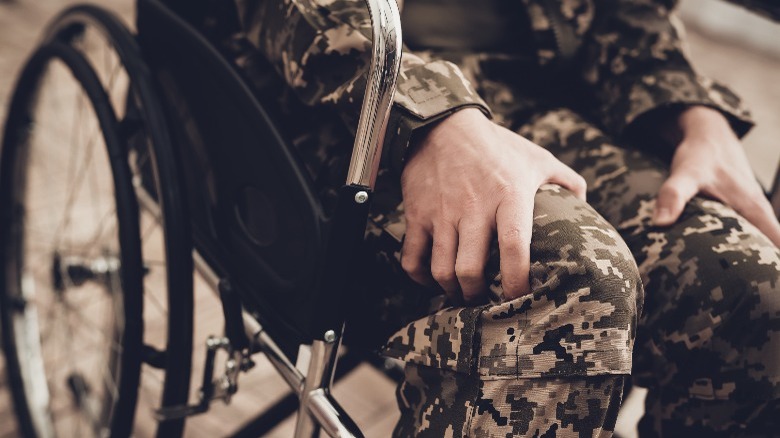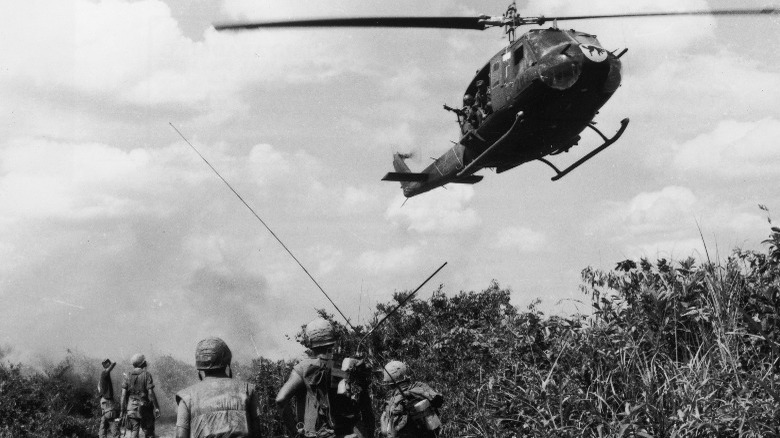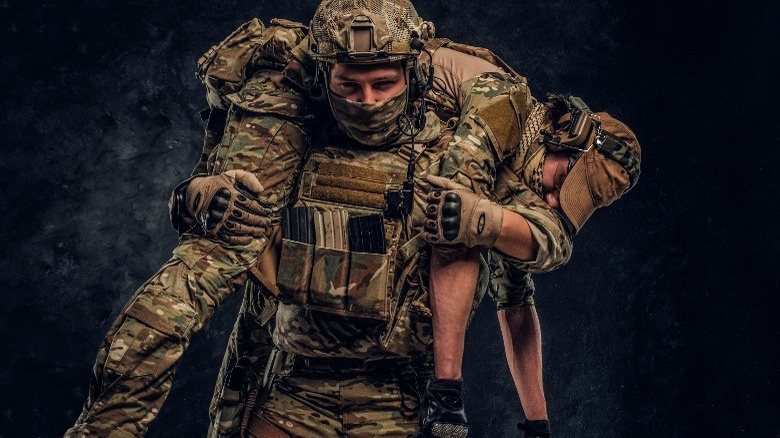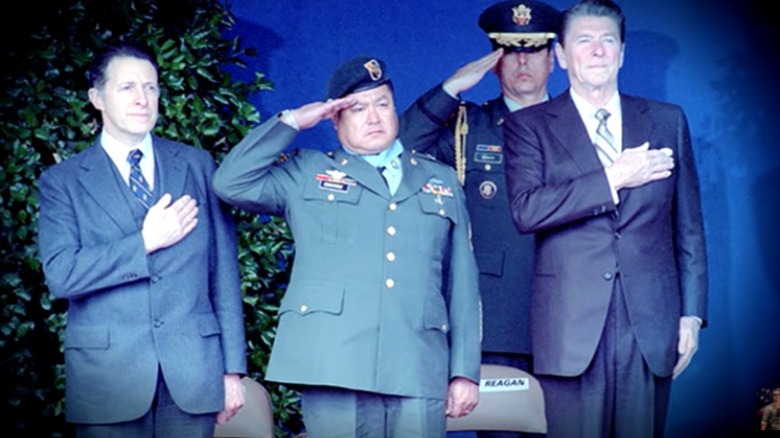The Incredible True Story Of Master Sergeant Roy Benavidez
Serving one's country through military service is one of the bravest things a person can do, but it is also potentially one of the most dangerous. The risk of danger obviously increases when a country is at war. This was especially true once America entered the Vietnam War in 1954. According to History, following an attack on U.S. forces in the Gulf of Tonkin in 1964, U.S. military presence increased, despite having been at war for a decade already. Increased military presence means more soldiers, and Raul "Roy" Benavidez answered the call.
While the name of Roy Benavidez is probably one you haven't heard of, it is most definitely a name you should know. His story is one that makes all those war films look extremely pale in comparison and is almost too incredible to be true. Read on to find out more about one of the most unbelievable soldiers to ever serve the United States.
The odds were stacked against him early on
For Roy Benavidez, life had never really been easy, according to War History Online. He was orphaned as a child and a high school dropout by the age of 15. Despite these obstacles, Benavidez managed to rise above them and enlisted in the Texas Army National Guard in 1952, when he was 17. He served as a national guardsman for three years before transitioning to active duty, according to Naval History and Heritage Command. Benavidez then trained to become a part of the Army Special Forces and was assigned to the 82nd Airborne Division by 1959.
In less than a decade, Benavidez had risen through the ranks and become an elite among soldiers. One can assume he was extremely good at his job because in 1965, he was sent to Vietnam for the first time as an adviser to their army. It was during this deployment that something happened that changed his life forever.
He didn't take no for an answer
Roy Benavidez was a seasoned soldier and Green Beret by the time he went to Vietnam for the first time in 1965, according to Dallas Morning News. So imagine the shock and dismay when he was horribly injured after stepping on a landmine. His wounds were so bad that the doctors told him that he would never walk again. As these doctors prepared to discharge him from military service, Benavidez decided that was not going to be his fate.
According to War History Online, he took his recovery into his own hands. He started with just wiggling his toes. Once he accomplished that, he began to use his elbows to help him start to crawl. Then this guy attempted to get out of bed on his own. Incredibly, his persistence paid off because a year later he was walking. Then, the sergeant did something even more astounding. He returned to Vietnam for a second tour two years later in 1968.
An unbelievable act of bravery
As if his miraculous recovery was not enough, Roy Benavidez then did something so courageous and unthinkable, you almost wouldn't believe it. According to HistoryNet, on May 2,1968, Benavidez heard a call for help over the radio. A group of 12 men, including three fellow Green Berets, were ambushed by the enemy and in desperate need of help. Benavidez answered the call, but in an unconventional way.
Without authorization or orders, he didn't hesitate to grab a medical bag and hop into the nearest helicopter to reach his comrades. According to War History Online, he was also only armed with a knife. Yes, he had no gun and then literally jumped out of a helicopter into a combat zone to try and save his men. His fellow soldiers were pinned down by nearly 1,000 enemy combatants. The odds of anyone getting out of this alive were slim to none. However, the actions he took once on the ground were even more unbelievable.
He became a walking miracle
Once Benavidez leapt from the aircraft, he attempted to take off toward where the men were located. According to Naval History and Command Heritage, he was immediately shot through his right leg, but kept running. He sustained additional injuries to his face and head before reaching his team. Despite being injured pretty significantly, he then began to organize the extraction of the wounded and dead soldiers. He carried and dragged them all to a waiting aircraft, while taking enemy fire and simultaneously providing cover, so his men could escape.
Unfortunately, as his men were trying to get away, they were shot down. Theoretically, that should have been the end of that, right? Wrong. Roy Benavidez refused to accept defeat. He then rescued his men from the downed aircraft, and then called in air strikes while trying to organize yet another extraction. While he's doing all this, they are still taking enemy fire, and he sustained many more wounds. Benavidez still managed to get his men into another craft to get them out. He only allowed himself to be removed once he had secured all classified documents and killed two more enemy soldiers who were trying to stop their withdrawal.
In all, Roy Benavidez sustained 37 wounds, from gunfire, shrapnel, and bayonets, according to SOFREP. He also suffered a broken jaw and was reportedly holding his intestines in during the last evacuation. Doctors initially thought he was dead, but he let them know that was not the case by spitting in their faces. Against the odds, he saved eight fellow soldiers and miraculously survived his injuries as well.
It took over a decade to honor this hero
Due to the extensive nature of his wounds and the fact that doctors were convinced that he was not going to live, Roy Benavidez was awarded the Distinguished Service Cross, per Naval History and Heritage Command. However, he did recover, and General William C. Westmoreland nominated him for an upgrade to the Medal of Honor in 1973. Unfortunately, the time limit to submit for this honor had passed by this time, so it literally took an act of Congress to allow this award to be granted.
They hit another road block. At the time, it was believed no one was still alive to verify his heroic actions, so the Army initially denied Benavidez his Medal of Honor, according to SOFREP. Remarkably, radioman Brian O'Connor (who made the initial distress call that day) was still alive and living in Fiji. He came forward and verified the story of how Benavidez saved them all. Based on his testimony, President Ronald Reagan finally awarded Roy Benavidez the Medal of Honor in 1981.
Following his retirement from the military, Benavidez spent his time speaking to children across the country about "education, learning a trade, and love of country," which he reportedly loved doing. Sadly, he passed away from complications associated with diabetes on November 29, 1998. Master Sergeant Roy Benavidez was the definition of a super soldier, and the legacy he left behind is still being honored today.
